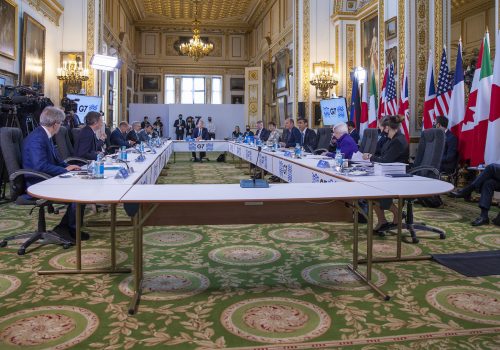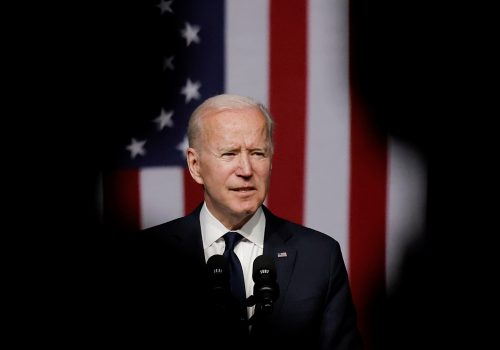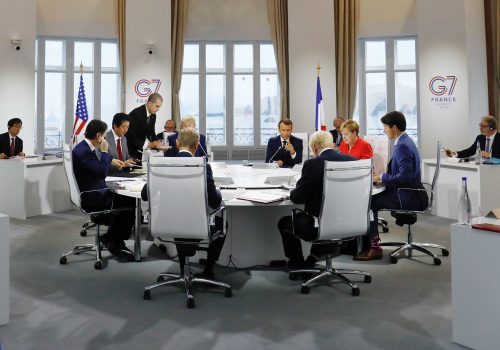FAST THINKING: The world has a new Atlantic Charter
JUST IN
It’s throwback Thursday for diplomacy. US President Joe Biden and UK Prime Minister Boris Johnson signed a new Atlantic Charter today—a statement of principles to guide their collaboration on everything from enhancing cybersecurity to promoting democracy. The charter, coming at the start of Biden’s first overseas trip as president, represents an effort to reinvigorate the “special relationship” between the two nations amid a slew of global challenges. But what new forms of cooperation will it unleash among democracies more broadly? And what will it mean for the emerging struggle between democracies and autocracies? We checked in with our experts, who in April urged Biden to adopt a new Atlantic Charter based on an Atlantic Council task force’s “Declaration of Principles” that was endorsed by Jake Sullivan, Tony Blinken, and Laura Rosenberger, all now top officials in the Biden administration.
TODAY’S EXPERT REACTION COURTESY OF
- Daniel Fried (@AmbDanFried): Weiser Family distinguished fellow and former US assistant secretary of state for Europe and Eurasia
- Ash Jain (@ashjain50): Senior fellow overseeing the Scowcroft Center’s Democratic Order Initiative and former member of the secretary of state’s policy planning staff
The charter, in context
- The original Atlantic Charter, signed in 1941 by US President Franklin D. Roosevelt and UK Prime Minister Winston Churchill as World War II loomed, “was the original mission statement for what we now call the liberal world order, which, for all its failures and inconsistencies, brought three generations of peace and growing prosperity” to the world, Dan says.
- The new charter carries its own historical weight, Ash says, arriving at a time when “the world is entering a new era of strategic competition between democracy and autocracy, with democracies on the defensive and autocratic rivals gaining strength.”
Subscribe to Fast Thinking email alerts
Sign up to receive rapid insight in your inbox from Atlantic Council experts on global events as they unfold.

Fresh challenges
- The new charter includes eight pillars of cooperation between the two nations that Dan notes are designed “to address challenges both old (like aggression coming from tyrants) and new (climate change).”
- But as Dan points out, we’re no longer living in the world of FDR and Churchill: “The US and UK can’t shape the world as they did after World War II.” Other nations will have to buy into this new mission statement.
More charter chatter
- That’s why this might not be the last charter of Biden’s trip. “To succeed, such a charter will need to have the support of a broader group of democracies,” Ash tells us. The leaders who gather at the Group of Seven (G7) Summit, which begins tomorrow in Carbis Bay, England, will reportedly consider signing on to an “Open Societies Charter,” which Ash says would be “a positive step in this direction.”
- The original Atlantic Charter, Ash points out, helped spawn the United Nations, NATO, and the General Agreement on Tariffs and Trade, which eventually became the World Trade Organization.
- And these new charters should similarly inspire transformative actions, Ash argues. Our era needs a “D-10” forum of like-minded democracies, he says, as well as a “democratic technology alliance to foster common technology norms, a new trade agreement that aligns the free world around a common vision for expanding a free and fair global economy, and perhaps an alliance of free nations to advance and foster democratic norms.”
- Dan notes how this all fits within Biden’s broader foreign-policy strategy: “Joe Biden has stressed that he wants democracies to come together, start fixing their (and global) problems, and thus better contend with the despots who argue that their time has come. The Atlantic Charter 2.0 is not the answer. But it’s a good beginning of an answer and, hopefully, the beginning of a good week for a democratic comeback.”
Further reading
Wed, Jun 9, 2021
IN BRIEF: Why the G7 summit matters, in seven charts
New Atlanticist By
The G7 is meeting in person for the first time since the pandemic began. The GeoEconomics Center explains the top seven issues on the agenda and why they matter.
Tue, Jun 8, 2021
Biden is building a doctrine around democracy. Will it work?
New Atlanticist By Daniel Fried
It’s a compelling vision. But achieving it will be fraught. As the United States has discovered many times, big plans have a way of breaking down when they meet messy reality.
Tue, Jun 8, 2021
From the G7 to a D-10: Strengthening democratic cooperation for today’s challenges
Report By Ash Jain, Matthew Kroenig
With the rules-based democratic order under threat, leading democracies need to develop common strategic approaches that pool their collective influence to confront today’s challenges.
Image: US President Joe Biden speaks with Britain's Prime Minister Boris Johnson as they look at historical documents and artefacts relating to the Atlantic Charter during their meeting at Carbis Bay Hotel in Cornwall, Britain on June 10, 2021. Photo via REUTERS/Toby Melville.


